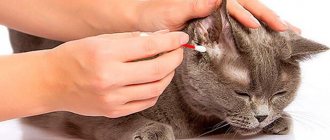Is it possible to give a cat salt? Cats need salt!
Salt (NaCl, sodium chloride) is useful for cats and therefore needed, like any mammal: approximately 21 mg per day (for comparison, about 7000 mg of salt fits in 1 teaspoon). That is, very little sodium chloride is needed.
Article continues after advertisement
Why is salt needed? It helps maintain metabolism and is necessary for a number of important processes in the body. Without salt at all, the cat's body will die. However, there is enough salt in natural products - that’s why it is believed that cats should not add salt to their food.
But if you look at the composition of industrial feeds, you will certainly see salt there. This is done not only for the benefit, but also because salt enhances the flavor and is a natural preservative. However, manufacturers do not indicate its percentage. All that remains is to rely on their integrity, that is, on the fact that they do not add more salt than necessary.
Carps
Carp is another type of fish that should not be fed to cats. They also live in dirty water bodies, which is why they end up in the cat’s dish in an already infected form. By the way, according to statistics, it is carps that most often turn out to be carriers of helminths.
We should not forget that carp, which constantly live in dirty reservoirs, very quickly accumulate salts of heavy metals, which, if consumed regularly, begin to be deposited in the cat’s body. This will definitely not lead to anything good.
Should I add salt to my cat's food?
Salt, as a rule, is not added to natural foods. But there is one “but”. The fact is that most of the salt is contained in the blood, and butchers drain the blood - and very little of it remains in the meat. That is, the meat loses its natural saltiness. Not to zero, but not reaching the norm either. How to solve this problem?
You can give your cat organs that represent a blood depot: the liver and spleen. Blood clots are also found in hearts. Heart can be given in unlimited quantities, and liver and spleen can make up up to 5% of the diet, because in large quantities cause side effects, in particular diarrhea.
If the cat does not consume these organs, blood can be purchased separately. Some butchers sell it. If you buy liquid blood, it must be frozen for at least three days before use, just like meat. For convenience, the blood can be poured into ice cube trays. And then add one cube at a time to the plate along with food.
And after defrosting, do not pour out the blood that is contained in the pieces of meat that you feed the cat, but carefully pour it into the cat’s bowl.
Thus, if a cat regularly consumes meat with a small blood content or bloody organs, the food does not need additional salting. But, if there are no such products in the diet, many nutritionists believe that it is still necessary to periodically add salt to the meat: at the rate of 0.5-0.9 grams of salt per 1 kg of meat. In this way we recreate the natural saltiness of the flesh and blood.
Instead of salt, you can add a small piece of sea fish to your food or have one fish meal per week: there is more salt in sea fish than in meat. This does not mean canned or dried fish, but raw or boiled (baked).
Article continues after advertisement
Another option is to put two bowls of water: one with an isotonic solution of water (0.9% salt, which corresponds to the natural salinity of the blood), the second with fresh water. The cat will choose what to drink. If your cat drinks salt water, it means that she really does not have enough sodium chloride.
Many people ask what to do if a cat licks salt? Most likely, this means that there is not enough of it in the diet. Then follow the advice in this article on how to properly give salt to your cat. But you shouldn’t let him drink too much at one time: this can lead to poisoning.
Sugar and sugar-containing products
Some cats have a special interest in desserts. As a rule, they are attracted to confectionery products that are rich in fat. This is what makes a cat want to try a sweet dish and even love such food. The pet cannot experience the taste of sugar itself, since it does not have receptors on its tongue that distinguish sweetness. Thus, a cat that has eaten a piece of cake will not be able to share the owner’s delight in the dish and, on the contrary, will worsen its health.
How does sugar affect a cat?
Veterinarians note the negative impact of sweets on the animal’s body. The destructive effects of sugar are divided into three directions:
- dietary;
- dental;
- gastroenterological.
The first is explained by the excessive calorie content of sweet foods. It is difficult for a cat's body to cope with the amount of energy that confectionery products provide, and a certain part of it remains unspent. Over time, it turns into fat. If family members regularly feed your pet sugar-containing foods, he will gain significant weight. Excess body weight leads to obesity, heart disease and other organs, and diabetes.
Sweets seriously damage human teeth, but a cat’s enamel is 10 times thinner. Sugars in a pet's mouth provoke the growth and spread of various bacteria. They begin vigorous activity that destroys the tooth structure, causing caries, periodontitis and other serious diseases.
How many cats can you have in an apartment by law?
We recommend reading: Stop-Stress for cats and dogs - instructions for use
When a cat eats a lot of sugar, its digestive system goes haywire. The balance of microflora living in the gastrointestinal tract is disrupted, and the number of bacteria in the intestines increases significantly. Problems in the gastrointestinal tract can be determined by changes in stool and the occurrence of diarrhea.
Chocolate is especially dangerous for animals. This is due to the caffeine and theobromine content. While the first substance causes increased heart rate, tremors and excessive activity, the second is often fatal. Xylitol, which is used to add a sweet taste to foods, is also harmful to cat health. It dramatically increases insulin levels and decreases glucose levels, which can lead to coma.
The optimal dose of sugar and is it possible to give it to a cat at all?
Sweets are strictly prohibited for pets, so you should not feed them such foods. A small piece of cake can result in huge expenses for veterinary care, so don’t take the risk.
To treat your pet, purchase special treats for cats. They have a brighter taste and also do not contain harmful substances in their composition. At the same time, you need to know moderation in everything and not overfeed your pet with treats that cannot become a full-fledged replacement for balanced food.
What kind of salt should I give my cat?
If you decide to periodically add salt to your cat’s food, you need to understand that not just any salt is suitable. Yes, the formula is sodium chloride (NaCl). However, the product is different from the product. For example, you should not use extra salt, which is subject to harmful processing. It is better to give rock or sea salt, as well as pink Himalayan salt, which is also supplied with other useful trace elements.
Can cats eat salted saddle as a source of sodium chloride? If there is nothing in it except salt, then again, as a small and rare addition to the main menu, herring is acceptable and even healthy. Likewise salmon and mackerel. But still, it is better for people to avoid salty foods and prefer fish that has not been artificially added.
Among other sources of salt, seaweed is suitable as a food additive. Just before serving in a bowl, for example, with meat or cottage cheese, it needs to be soaked in boiling water and chopped.
But if your cat eats pickles, olives, dried and dried fish, this is already bad. We need to figure out whether he really needs salt there? Perhaps he likes some other taste. For example, cats, like people, are susceptible to monosodium glutamate. But, one way or another, there is nothing useful in any canned food for a cat.
Is it possible to give a cat salted herring? Isn't salty food dangerous for his life?
he watches people eat herring and also wants to be
in the photo, not my cat
not dangerous will not eat more than necessary
Of course, you can’t feed him salted herring constantly! But I think that’s not what you’re asking about and the scary articles about “Cat Poisoning with Table Salt” won’t be useful to you. You are probably asking about the situation when you are sitting, eating delicious fish, and this mustachioed face walks nearby and hints in every possible way that he also really wants to try this dish. A couple of pieces won't do anything! My cat also sometimes feasts on herring, salmon, etc. This is the same delicacy - that is, rarely and a little at a time)))
And in nature, cats eat salted mice, salted birds, and salted mushrooms. How do you think .
It is forbidden. Read at your leisure: Cat poisoning with table salt The cause of salt poisoning in cats can be feeding them salty food waste, fish, other products, brines. Young and emaciated animals are more sensitive to an overdose of sodium chloride; the lack of water increases the toxicity of salt. Long-term consumption of high doses of salt can lead to chronic poisoning. When salt poisoning occurs, the functioning of the central and peripheral nervous systems is disrupted, as well as dehydration of cells of vital organs. This causes a short-term increase in metabolic processes, followed by a long-term inhibition. High concentrations of salt irritate the mucous membranes of the stomach and small intestine. As a result, gastroenteritis develops, which is accompanied by hemorrhages. In severe cases, death from asphyxia may occur. After eating a large amount of salt, cats develop a depressive state and experience paralysis. Animals refuse food, but drink water greedily. As a result of developing asphyxia, visible mucous membranes become bluish. Muscle tremors and convulsions occur. Body temperature does not change. First aid is to saturate the body with water: you need to give it as much as possible. If the cats themselves no longer drink, they do deep and abundant enemas. In addition, water is introduced into the stomach through a tube. In the future, animals should be given mucous decoctions of flaxseed and starch.
Just don’t feed it carbide, otherwise it will swell, and cats eat everything, and don’t eat anything they don’t like.
Absolutely not. He will live wonderfully without it. Or do you mean that there is nothing else to eat? :)))
punch the cat in the face, don’t bother looking at who’s eating there
Better not try, otherwise mine was poisoned by it once!
undesirable, stress on kidneys
Animals do not need salt at all, especially salted herring. For what? Or is there nothing else to feed? If he asks too much, send him to the garden.
No you can't! salt is poison for animals! You can give it a little salt, but not too much. My friend’s puppy died from this. He ate 7 heads of herring. And then beer. Necessarily )))))
Yes, give him a herring. He'll try and maybe calm down. Although he may become addicted, it is unlikely. Jack London has a story “Royal Analastanka”, where two American Kents, in order to win a prize at an exhibition, kept a street cat in a cage in the cold and fed herring heads to make the fur thicker. This is how they received the first prize. This is not me, this is a classic, nothing about the moral side.
What other fish are banned?
Under no circumstances should cats be given smoked or salted fish. For animals with kidney problems, such nutrition begins to cause harm very quickly, and for completely healthy animals - slowly, but quite surely.
As for smoked fish, it has a destructive effect on the animal’s liver, and its consumption also leads to irritation of the gastric mucosa.
Source
Herring
By feeding your cat herring, you supply his body with an enzyme, trimethylamine oxide, which destroys vitamin B1, which is necessary for the normal functioning of all metabolic processes in it. This enzyme is concentrated mainly in the heads of the herring, as well as in the insides - these are the parts that the pet often gets when cutting the fish.
By the way, due to the hormone contained in herring, cats often experience anemia - their body begins to poorly absorb iron.
Don’t forget that canned herring, which people often feed to their cats, has a laxative effect on the pet’s digestive system.











